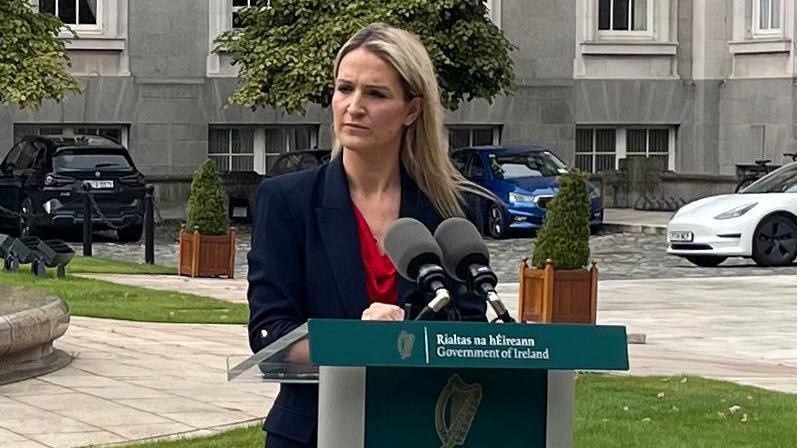Irish defamation law facing wide-ranging reform

Justice Minister Helen McEntee said the bill would safeguard freedom of expression
- Published
Irish government ministers have published a new Defamation Bill as they prepare to make wide-ranging reforms to libel laws.
They said the bill aims to tackle "disproportionate" compensation awards and make it easier for people to defend their reputation when they are "unfairly attacked".
The draft legislation includes a proposal to abolish juries in High Court defamation cases.
Ministers said this would significantly reduce legal costs and delays in the court system.
They also said it would make the process of seeking redress more "predictable" and reduce the likelihood of courts awarding disproportionate damages to litigants.
Protecting 'press freedom'
The bill also includes protective measures for those who are targeted by SLAPP (strategic lawsuits against public participation) cases.
Minister for Justice Helen McEntee explained SLAPP cases were when "a plaintiff launches unfounded defamation proceedings against an individual or an organisation in order to silence responsible investigation, discussion or debate on matters of public interest".
鈥淪LAPPs are recognised internationally as a significant challenge to press freedom and democracy, given the chilling effect they have on the work of investigative journalists and others," she added.
Ministers also said they want to protect retailers who are increasingly finding themselves facing costly defamation actions.
There has been a rise in the number of business owners who have been taken to court for asking customers to show proof of purchase as they pass a checkout, or refusing to accept banknotes which they fear are not legal tender.
Minister of State for Law Reform James Browne said the bill "will address concerns, particularly among small and medium businesses, about a large recent increase in unfounded claims of defamation made against retailers".
'Complex media landscape'
The text of the bill has been agreed by the government and will be published next week.
Minister McEntee said the bill will be worked on over the summer and she was hopeful it could be introduced to the D谩il (Irish Parliament) in the autumn.
鈥淥ur democracy needs defamation laws that meet the challenges of an increasingly complex media landscape," she said.
鈥淭he overarching aim of this bill is to safeguard freedom of expression, the right to protection of good name and reputation, and the right of access to justice."
Related topics
- Published23 February
- Published10 January
- Published2 November 2016